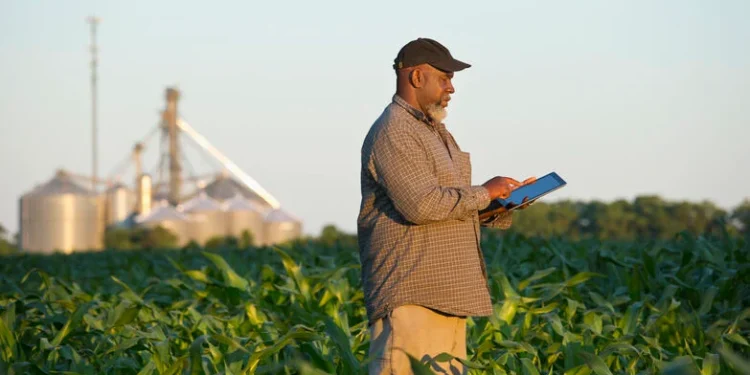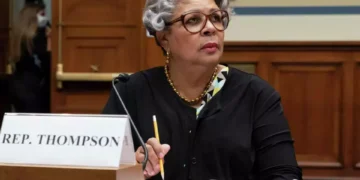March 26, 2025 Story by: Editor
For weeks, Jocelyn Germany has been grappling with a pressing question: “Is it safe for us to exist” as Black farmers? The uncertainty arose after the U.S. Department of Agriculture (USDA) made budget cuts that jeopardized her work.
Germany serves as a farmer advocate for Farm School NYC (FSNYC), an urban agriculture education center dedicated to food sovereignty and social, economic, and racial justice. The USDA provides approximately 85% of FSNYC’s funding.
The center was preparing to roll out a citywide pilot initiative in New York focusing on food justice, crop management, and urban farming advocacy. However, this effort came to an abrupt halt when the USDA terminated a $300,000 National Institute of Food and Agriculture community food projects grant. As a result, FSNYC was forced to scale back its programs and introduce a sliding scale for tuition.
Other initiatives were also affected, including public courses on food stewardship. The center had planned to distribute mini-grants and build community capacity, but those efforts are now on hold. FSNYC even considered reducing employee benefits to allocate more resources to its programs. “Our main goal is to keep Farm School in operation,” Germany stated.
The effects of these USDA cuts have rippled through the farming and agricultural communities, prompting a collective response to mitigate the damage. FSNYC is part of the Black Farmer Ecosystem, a coalition of Black farms and agricultural organizations working to strengthen local food systems in the U.S. Northeast. The consortium was created to pool resources rather than compete for funding, emphasizing collaboration in fundraising and programming.
Now, members of the coalition face a combined $1.2 million funding gap due to these cuts. FSNYC and Black Farmers United–New York State (BFU-NYS) have been hit particularly hard. The USDA’s decision to freeze or cancel National Institute of Food and Agriculture grants and Natural Resources Conservation Service contracts has put both salaries and programs in jeopardy.
“We are in survival mode,” Germany explained. FSNYC had already begun shifting some of its financial reliance away from government funding, but “the sudden defunding was not the way we wanted to do it,” she said.
BFU-NYS, which consists of growers, advocates, and food educators, recently became an independent organization after previously operating under FSNYC’s fiscal sponsorship. The group lost a five-year, $660,000 contract with the USDA’s Natural Resources Conservation Service. This funding was intended to support three annual statewide “Bridging Land, Agriculture, and Communities” conferences, with the first planned for April.
However, about a week after Donald Trump’s inauguration, BFU-NYS received an email from the USDA informing them that their contract was being terminated because their work fell under diversity, equity, and inclusion (DEI) programming. As a result, this year’s conference was canceled, but BFU-NYS remains determined to hold the event in 2026, with or without government support. The organization is now seeking private donors to fund it.
The sudden loss of funding has left BFU-NYS scrambling to cover expenses already incurred for the event. “We have done the background work, got participating partners, submitted deposits and signed contracts,” said Dr. Kuturie Rouse, BFU-NYS’s executive director of development.
Without the USDA funds, BFU-NYS cannot reimburse full-time staff for the extra hours they spent organizing the conference, nor can it recover costs for supplies. The organization is also obligated to pay vendors and collaborators despite the event’s cancellation. “The organization is already at a loss,” Rouse said.
Another casualty of these budget cuts was BFU-NYS’s Green Futures program, which focused on addressing food insecurity, supporting community gardens, and encouraging young adults to pursue careers in agriculture. Last year, the program launched a pilot initiative at a middle school in the South Bronx, where students cultivated watermelon, callaloo, lettuce, and other produce. The harvested food was then used in the school cafeteria to feed students. BFU-NYS now hopes to secure local partnerships to revive and expand this initiative.
Beyond the financial strain, Rouse noted that the mental well-being of BFU-NYS staff has suffered. Following the contract termination, staff members faced an influx of racist emails and social media harassment. “It was hate mail just because of our name and who we support and sponsor,” Rouse said, clarifying that while BFU-NYS focuses on communities of color, it is an inclusive organization that “work[s] with any and everyone.”
At a time of immense stress, mental health support has become crucial. The Northeast Farmers of Color Land Trust (NEFOC), which promotes climate stewardship and regenerative farming, has also been affected. Christine Hutchinson, a founding board member of NEFOC, revealed that a $200,000 collaborative mental health program for farmers from Maine to Delaware has suffered due to funding cuts. Despite the uncertainty, she affirmed the initiative would continue. “People are really rocked,” Hutchinson said.
Many individuals are seeking connection and support in these challenging times. Monti Lawson, founder of Catalyst Collaborative Farm, has been particularly impacted by the funding cuts. Having encouraged numerous farmers and partners to apply for USDA grants, he now sees those funds drying up. His farm, which provides a space for queer and BIPOC communities to farm and organize, relies on donation-based and sliding-scale events—previously made possible by government funding. “For government and even philanthropy, ‘QTBIPOC’ was a very sexy word,” Lawson remarked.
Lawson has been reaching out to past funders and community members for support. “In this particular moment, there are so many people who are reaching out, trying to be comforted, trying to be connected to others,” he noted.
Hutchinson emphasized that the impact of these cuts will not be uniform. “A larger farm in a different place has access to resources that our farmers just don’t have access to,” she explained. Farmers associated with NEFOC were already operating with minimal federal assistance, making it even harder for them to replace lost funding. Meanwhile, agricultural organizations are working to document the impact of these cuts. The Hudson Valley Young Farmers Coalition, where Lawson is a member, is gathering testimonials from New York farmers, while the National Young Farmers Coalition is conducting similar efforts nationwide.
Amid the financial crisis, Black Farmer Ecosystem members and other agricultural organizations are actively seeking alternative funding sources. In mid-February, FSNYC launched an emergency fundraiser to address its budget shortfall, support its scholarship fund, revamp courses, and pay farmer facilitators. So far, it has raised $750.
Given the instability of federal funding, consortium members are exploring other financial avenues. FSNYC has been creating advocacy toolkits and facilitating direct engagement with lawmakers. BFU-NYS recently introduced a mobilization strategy prioritizing funding from state and local governments. One of its strongest supporters is New York State Representative Khaleel Anderson, who chairs the state’s food and farming nutrition policy task force. Anderson has secured a dedicated budget line for BFU-NYS in the New York state budget for the past three years and is now pushing for increased funding. Additionally, BFU-NYS aims to access New York City Council discretionary funds and corporate social responsibility grants to sustain initiatives like its Green Futures program.
Some advocates argue that those with privilege and influence should take to the streets in protest, while QTBIPOC, immigrant, and food justice communities—who are often on the frontlines—should take a step back.
Karen Washington, a longtime food justice advocate and board member of the Black Farmer Fund, took immediate action by calling on her LinkedIn network to donate in response to the funding shortfall. “There are foundations, hedge funds, venture capital groups, and Wall Street executives who can write a check in an instant without losing a cent,” she wrote. In an interview, Washington questioned the lack of public reaction: “Where are the people that voted for this? Where is the outrage?”
Source: The Guardian

















